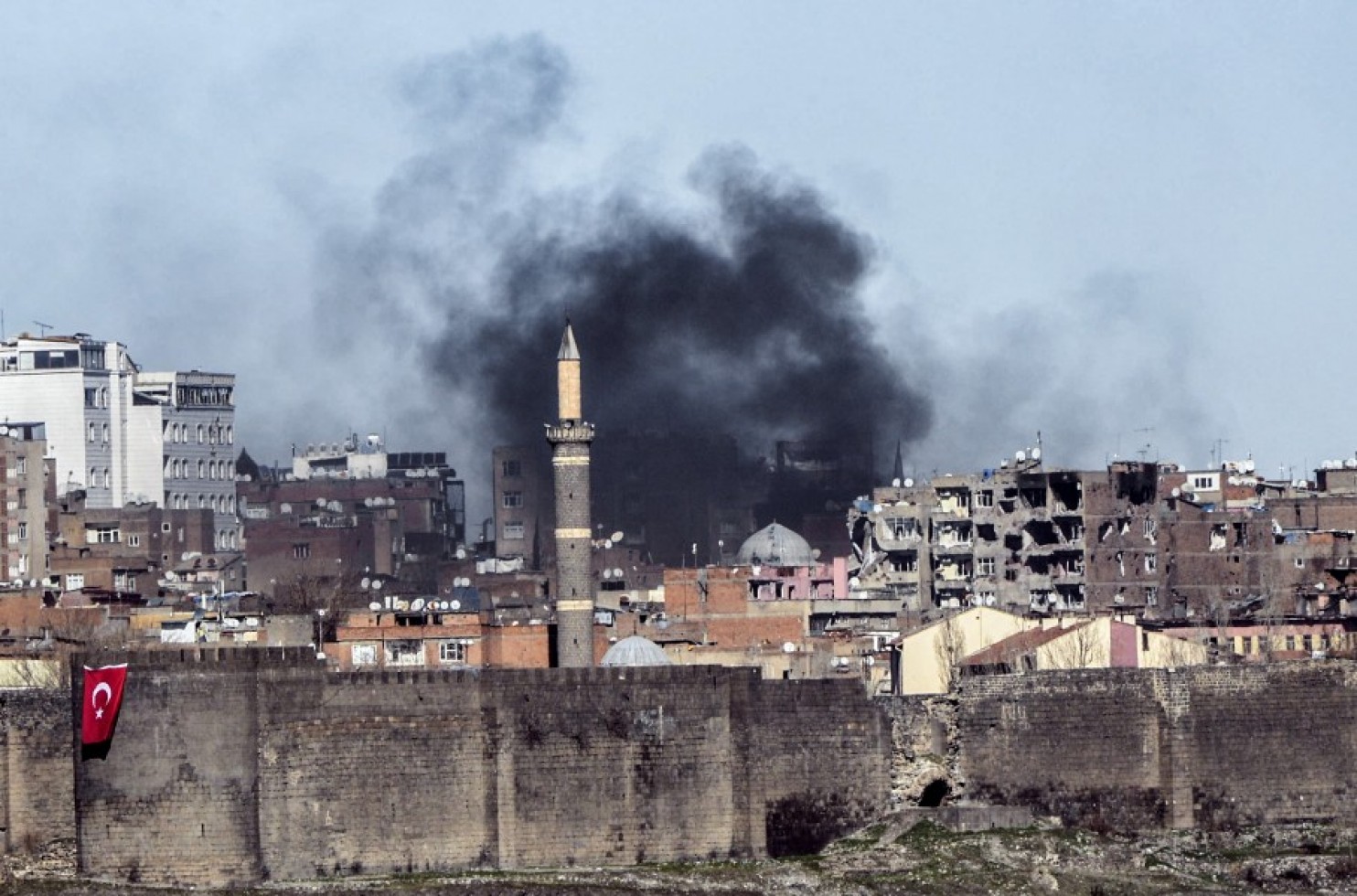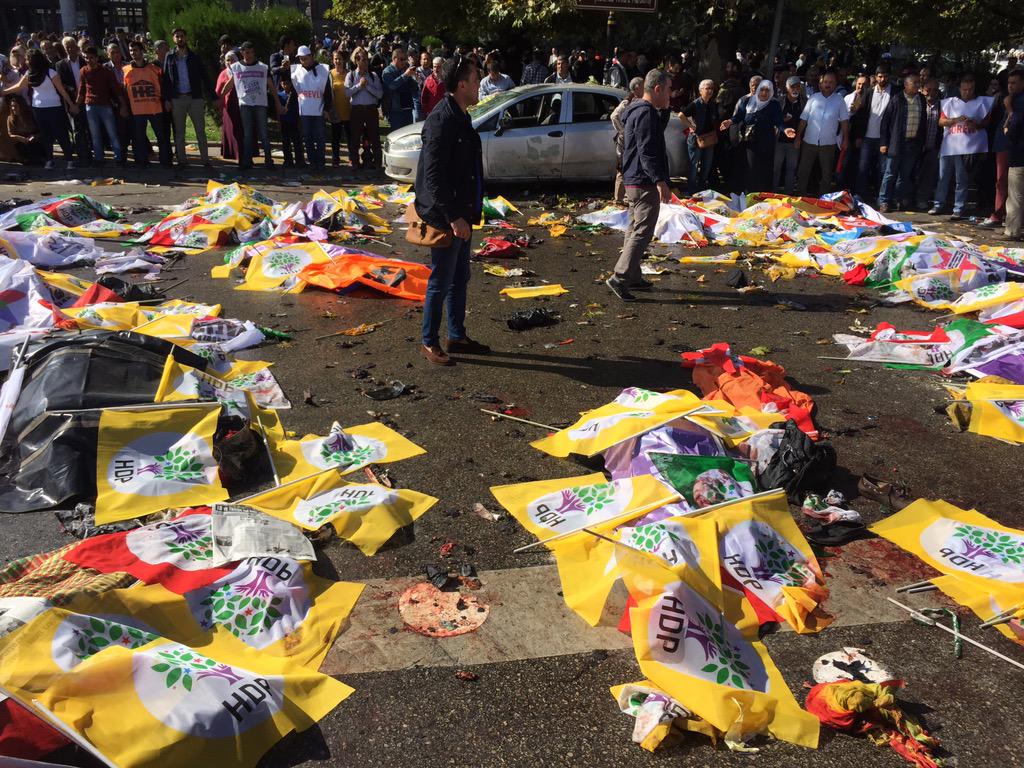 Destruction wrought by Turkish state in DiyarbakДұr.
Three-hundred-and-fifty thousand. That is the number of people displaced since the Kurdish-Turkish вҖңresolution processвҖқ was interrupted by the Turkish government of President Recep Tayyip ErdoДҹan last year.
Destruction wrought by Turkish state in DiyarbakДұr.
Three-hundred-and-fifty thousand. That is the number of people displaced since the Kurdish-Turkish вҖңresolution processвҖқ was interrupted by the Turkish government of President Recep Tayyip ErdoДҹan last year.
-
 Destruction wrought by Turkish state in DiyarbakДұr.
Three-hundred-and-fifty thousand. That is the number of people displaced since the Kurdish-Turkish вҖңresolution processвҖқ was interrupted by the Turkish government of President Recep Tayyip ErdoДҹan last year.
Destruction wrought by Turkish state in DiyarbakДұr.
Three-hundred-and-fifty thousand. That is the number of people displaced since the Kurdish-Turkish вҖңresolution processвҖқ was interrupted by the Turkish government of President Recep Tayyip ErdoДҹan last year.
-
 About 80 people rallied outside the Turkish consulate in Melbourne on May 25 to condemn the massacre of Kurds and support the People's Democratic Party (HDP) MPs now facing prosecution by the Recep Tayyip Erdogan government.
About 80 people rallied outside the Turkish consulate in Melbourne on May 25 to condemn the massacre of Kurds and support the People's Democratic Party (HDP) MPs now facing prosecution by the Recep Tayyip Erdogan government.
-
 Sydney's Kurdish community and their supporters took to Martin Place on May 23 in a snap protest against Turkey's increasingly repressive Recep Tayyip Erdogan government after it cancelled the parliamentary immunity of progressive opposition Peoples' Democratic Party (HDP) MPs. This is part of a bloody war the regime has been waging against the Kurdish people since June last year. Socialist Alliance candidate for the federal seat of Sydney Peter Boyle addressed the rally.
Sydney's Kurdish community and their supporters took to Martin Place on May 23 in a snap protest against Turkey's increasingly repressive Recep Tayyip Erdogan government after it cancelled the parliamentary immunity of progressive opposition Peoples' Democratic Party (HDP) MPs. This is part of a bloody war the regime has been waging against the Kurdish people since June last year. Socialist Alliance candidate for the federal seat of Sydney Peter Boyle addressed the rally. -
 Turkish military bombardment of Sur, DiyarbakДұr.
The Turkish government has a post-war plan to offer Kurds high-end housing in exchange for civil obedience.
Sur is a district in Turkey's southeast, part of the Kurdish capital DiyarbakДұr, that has been exposed to a round-the-clock curfew since December 2.
Turkish military bombardment of Sur, DiyarbakДұr.
The Turkish government has a post-war plan to offer Kurds high-end housing in exchange for civil obedience.
Sur is a district in Turkey's southeast, part of the Kurdish capital DiyarbakДұr, that has been exposed to a round-the-clock curfew since December 2.
-

Russian Prime Minister Dmitri Medvedev said in an interview with German newspaper Handelsblatt on February 11 that a threatened ground invasion of Syria by Western allies Turkey and possibly Saudi Arabia would lead to a вҖңnew world warвҖқ. On February 18, Hawar News Agency reported that вҖңdozensвҖқ of Turkish armoured vehicles had advanced 200 metres across the Syrian border.
-
 Turkey is rapidly descending into civil war as the government of President Recep Tayyip ErdoДҹan deepens its offensive against the Kurdish population, left-wing opposition parties, journalists and academics. The Turkish government says it is fighting the armed forces of the left-wing Kurdistan Workers Party (PKK), with which the government terminated peace talks last year. But the brunt of the state's violence has been directed against civilians.
Turkey is rapidly descending into civil war as the government of President Recep Tayyip ErdoДҹan deepens its offensive against the Kurdish population, left-wing opposition parties, journalists and academics. The Turkish government says it is fighting the armed forces of the left-wing Kurdistan Workers Party (PKK), with which the government terminated peace talks last year. But the brunt of the state's violence has been directed against civilians. -
 The following statement was issued by Women's Freedom Assembly (KГ–M) in Turkey/North Kurdistan on January 18. Translation abridged from . * * * The WomenвҖҷs Freedom Assembly is calling for your solidarity against the war and massacres that we have been living through for the past eight months.
The following statement was issued by Women's Freedom Assembly (KГ–M) in Turkey/North Kurdistan on January 18. Translation abridged from . * * * The WomenвҖҷs Freedom Assembly is calling for your solidarity against the war and massacres that we have been living through for the past eight months. -
 The Turkish government has declared all-out war against the residents of the Kurdish-majority town of Silvan (Farqin) in Diyarbakir (Amed) province. The town has been under curfew and siege since November 2. Artillery and military aircraft have been deployed by Turkish military and paramilitary forces. Residents have reported Arabic-speaking bearded terrorists вҖ” presumed to be ISIS вҖ” taking part in the attacks. Hopes that such government violence would end after the November 1 Turkish elections have been shattered.
The Turkish government has declared all-out war against the residents of the Kurdish-majority town of Silvan (Farqin) in Diyarbakir (Amed) province. The town has been under curfew and siege since November 2. Artillery and military aircraft have been deployed by Turkish military and paramilitary forces. Residents have reported Arabic-speaking bearded terrorists вҖ” presumed to be ISIS вҖ” taking part in the attacks. Hopes that such government violence would end after the November 1 Turkish elections have been shattered. -
 ErdoДҹanвҖҷs electioneering: aftermath of October 10 bombing in Ankara.
In TurkeyвҖҷs November 1 election, Recep Tayyip ErdoДҹanвҖҷs Justice and Development Party (AKP) increased its votes from 41% to 49% in the five months (143 days) from the election in June. The AKP won a majority of seats вҖ” 317 out of 550.
The governing party gained 5 million extra votes. It adopted very risky policies to get this result, but was determined to win the elections вҖ” no matter how many lives were lost.
ErdoДҹanвҖҷs electioneering: aftermath of October 10 bombing in Ankara.
In TurkeyвҖҷs November 1 election, Recep Tayyip ErdoДҹanвҖҷs Justice and Development Party (AKP) increased its votes from 41% to 49% in the five months (143 days) from the election in June. The AKP won a majority of seats вҖ” 317 out of 550.
The governing party gained 5 million extra votes. It adopted very risky policies to get this result, but was determined to win the elections вҖ” no matter how many lives were lost.
-
 One year ago, the Islamic State of Iraq and Syria (ISIS) began its brutal assault on the city of Kobane in the largely Kurdish region of Rojava in the north of Syria. The violent fanatics were seeking to destroy the profoundly democratic, multi-ethnic and feminist revolution under way in the liberated autonomous region.
One year ago, the Islamic State of Iraq and Syria (ISIS) began its brutal assault on the city of Kobane in the largely Kurdish region of Rojava in the north of Syria. The violent fanatics were seeking to destroy the profoundly democratic, multi-ethnic and feminist revolution under way in the liberated autonomous region. -
 The moment the bomb detonated. Ankara, October 10, 10:04am.
The following statement was released by Selahattin DemirtaЕҹ and Figen YГјksekdaДҹ, co-chairs of the Peoples Democratic Party (HDP), on October 12 in response to the October 10 bombing of a peace rally in Ankara organised by the HDP, trade unions and civil society organisations. Following the attack, police blocked ambulances and attacked survivors.
The moment the bomb detonated. Ankara, October 10, 10:04am.
The following statement was released by Selahattin DemirtaЕҹ and Figen YГјksekdaДҹ, co-chairs of the Peoples Democratic Party (HDP), on October 12 in response to the October 10 bombing of a peace rally in Ankara organised by the HDP, trade unions and civil society organisations. Following the attack, police blocked ambulances and attacked survivors.
-

Turkish trade unions began a two-day general strike on October 12 in protest at the bombings two days earlier at a peace march in Ankara peace march that killed more than 125 people, .